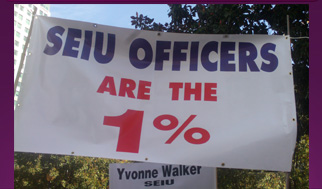Media
Union Members Protest Union Bosses Pay Grab
 California DMV worker Mariam Noujaim is furious with how union bosses are spending her hard-earned dues. In 2010, she and many other DMV workers were laid off while leaders of her union, the Service Employees International Union (SEIU) enjoyed raises.
California DMV worker Mariam Noujaim is furious with how union bosses are spending her hard-earned dues. In 2010, she and many other DMV workers were laid off while leaders of her union, the Service Employees International Union (SEIU) enjoyed raises.
Now a small group of SEIU members, including Mariam, are fighting back, demanding transparency and an audit of the union’s financial records. The group is also encouraging members from other labor unions to ask to see their own union’s financial records and examine themselves how their dues are spent. The SEIU revolt comes on the heels of Knox v SEIU, a U.S. Supreme Court case that in June found the union in California had improperly charged increased dues that went towards political spending.
The divide between union bosses and union members that Mariam experienced isn’t unusual. Here in Pennsylvania, being a government worker often means having to pay dues to a labor union just to keep your job. Labor unions benefit from the government deducting member dues and “agency” fees automatically from workers’ paychecks, just like a tax. Forced unionism and taxpayer-subsidized dues collection keep labor unions in business, and allow union bosses to collect hefty salaries.
Kathy Jellison, president of the SEIU in Pennsylvania, made almost $100,000 in total compensation in 2011 while the average SEIU worker made $47,754. The same year, former PSEA president James Testerman made $253,583 in total compensation, over four times the average teacher salary of $61,237.
For more on how government union bosses work against their own members and taxpayers, read The Squeeze: Government Unions’ Grip on Pennsylvanians.